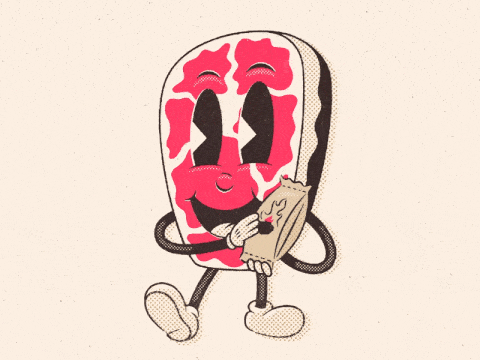One dozen links forwarded – AH AH AHH. Two dozen links forwarded – AH AH AHH. Three!!!

That’s me cosplaying as Count from Sesame Street as everyone and their dogs forward me a link to the recent New York Times piece about red meat being OK now. Or not. I don’t know which way is up anymore.
The article talked about a series of recently released meta-analyses that found the harm from eating red meat is minimal to the individual but shows a small health detriment over a large population of people.
Again, this didn’t come from a large, prospective, double-blind control trial, but a review of studies and articles done over the years.
Their conclusion, paraphrased: there’s insufficient evidence to tell people to reduce their red meat intake for a health benefit.
First eggs, now this? What’s a gal to do?
If you’ve read my stuff before, you can probably guess my article is not discussing the study or the NYT article but is more me doing what I do – pointing out the REAL problems. As per usual, my problem is with the binary framework that we spend our days pinging and ponging between.
Red Meat Or Not, Neal? What Do I Do?
I know, you’re eagerly anticipating my thoughts on the red meat debate. It hasn’t changed. And neither should yours.
Nutrition research is difficult as the impacts of dietary modification take a long time to manifest. Since we’re so complex, modifying a single variable (like a good study would dictate) is nearly impossible. Individual changes probably won’t dramatically change outcomes like we think they would when it comes to all of the different factors and choices that influence our long term health.
This is why we tell people to take the broad strokes we know work and optimize that. For a review, check out Dietary Jenga, and Eat To Fuel Your Fire. The basics: small frequent meals consisting of real food of balanced macronutrients – protein, healthy fats, and complex carbohydrates.
So, I’m not moving. Don’t eat lots of red meat, but red meat is fine. If you need it quantified, one American sized serving (about 1.5 normal servings) a few times a week at most. Ideally, I’d rather people swap beef for fish. Fish should be 4-6 times a week and red meat should be 1-2 times a week. We’ll get into it more at the end of the piece.
If you’re vegetarian or vegan, you should continue to not eat meat, no matter the color.
Was Less Red Meat Bad Advice?
The inflammatory title in the NYT suggests people were misled. I don’t think this was the case, as the best data we had illustrated a link (which still exists, despite the connotation of the article) and a positive impact from a public health standpoint by reducing intake.
Misleading is suggesting old data was misleading.
This article, for me, is nothing about cheeseburgers, but is instead a commentary on our modern society. It’s an indicator of how poorly we’re doing with the power of the internet. How we distrust institutions, but we do so because institutions are sowing that doubt for clicks.
Why are we like we are? I have a few players to blame…
Who’s At Fault
1. Us
I normally reserve my criticism of the consumer to rare instances as I believe the system is largely to blame for our modern woes. Today, I put our failures in the top slot.
Those of us who have formed an opinion about this news, may I ask a simple question? Did you even read the article?
Of those people, how many read the actual study?
What really happened (and did so on a GRAND scale) was the headline hit our feeds however we ingest data now — Reddit headline, Google News headline, Facebook headline, Twitter headline.
We read headlines and comments, not the article or actual source.
“Pssht, of course” was probably the general reaction. Some may have taken more of a position of despair, “Now what?” or “I don’t know which advice matters!”
Most people didn’t take the time to really evaluate either piece. Some waited for another (like me, right now) to further editorialize the editorial, and then ingested that info.
In short, we’re taking sides. Taking sides that don’t really exist.
The point of the article, I believe, was to point out a general distrust by the public of science, especially studies around nutrition. Our skepticism of truth comes predominantly from our inability to handle information, not from the information itself.
Why? Two simple reasons:
- We don’t read. We skim.
- We open ourselves up to too many sources, then skim all of that.
We can’t, then think critically about this subject because we’re taking on too much from too many sources, many of which are poor quality.
Look – I’m right there with you. I’m brain dead after working my 2-3 jobs to pay the rent. I don’t have the energy to do anything but skim. The difference, though, is that I’m trying like the Dickens to not incorporate this information into my worldview without further digestion and analysis.
We have to take individual responsibility. That doesn’t mean we can’t throw blame. And I’m throwing it at the media. In this case, the New York Times.
2. The Media
Don’t think for a second that the headlines – the only thing people are reading – aren’t being planned and optimized to get as much of a reaction and engagement as humanly possible.
In fact, that’s the modern marketer’s main goal: get as much attention as possible. They teach classes and have tools online how to optimize your headlines for clicks.
The media takes mediocre articles and creates the very distrust we’re talking about.
The headline itself is FILLED with innuendo: “Eat Less Red Meat, Scientists Said. Now Some Believe That Was Bad Advice.”
“Do this, THEY said…” That’s stoking the anti-authority mindset that’s plaguing the nation. Literally millions of people don’t trust real experts and instead look to the blogosphere for the opinions of people who’s greatest credentials are that they’re a mother who happens to read a lot. (I’m not thrilled with the babes and moms out there with so much influence, as you can tell… Moms and babes are great, they just shouldn’t interject without, I don’t know, specialized expertise, degrees, training, or knowledge)
Continuing on picking apart the title: “Now some believe that was bad advice.” Wait, they give us bad advice? I can’t trust them!
If I’m reading it correctly, the New York Times is giving this inflammatory topic some credence by talking about the “wishy-washy” nature of nutrition science. Then why isn’t the article called “Why Is Nutrition Wishy-Washy?” Simple! That won’t get clicks.
It reminds me of my recent fluoride article. I was sent physical copies and links to articles “connecting” fluoride to developmental problems in babies. Long story short, a controversial garbage study that other scientists lamented the journal and authors for was published and made the rounds in the media.
Despite the issues raised by peers, it made it out. The papers, though, were quick to run the study with the headlines, because they want money. Who isn’t going to read something that says “New study raises questions about how fluoride affects children’s development”?
Back to steaks… The same thing comes up. Half of the article and most of the commentary is beating up a Harvard Doc aka someone smarter than most of the people commenting. Dr. Hu cites the study as “irresponsible and unethical.” It’s framed in a way to have the “establishment” being backed in the corner with this new data and showing hypocrisy. “The results don’t support Big Beef’s agenda, and scientists are paid off well by them, so of COURSE they have a problem with it.”
Publishing the study probably could easily be viewed as irresponsible because we’re not publishing in a bubble anymore. We all know that the good, bad, and ugly studies will all be published, and if there’s a shred of controversy, it’s going to blow up and be misinterpreted.
Science nerds and career professionals are not the intended audience, it seems, for much research. So, I’m with Dr. Hu. It’s irresponsible to publish the data without significant public relations efforts or big asterisks to help both us and the media get the big picture straight.

I’m calling out the New York Times on this one: your article itself is creating distrust in institutions while masquerading as a balanced and thorough discussion.
Neal’s Advice For A Better Beefy World
Here’s how I’d like us to proceed to make this place better in light of this craziness.
1. Take it easy on red meat.
I don’t care what this one study’s results and resulting media storm is clearly telling you. It’s being misinterpreted.
The REAL study is saying that the numbers needed to show a benefit from reduced red meat intake to an individual are very large. Meaning it doesn’t dramatically raise your risk, but if all of our society ate lots of red meat, we’d have higher heart disease.
Great, let’s ignore that. Or the fact that beef/red meat farming produces tons of greenhouse gasses and the only thing we’re going to focus on is the heart disease risk.
At the individual level, red meat will more likely than not contain saturated fat. That needs to be limited no matter what. By reducing your red meat intake, you keep your saturated fat intake below our max recommended amount. Less saturated fat, along with other risk factor reduction, will keep your heart healthier.
All the franken-foods that involve red meat are still a no go. Bacon, sausage, hot dogs, all that stuff that’s ground up lips and buttholes.
2. Stop clicking.
They do more bullshit because we engage. In the digital world, we can very easily dictate what gets repeated and what does not.
The only way to get anything done is to vote with your wallet. The same outlets that give hate speech a billion dollars worth of air time, mass murderers their 15 minutes of fame, and controversial or inconsequential scientific data points added subtext to sway opinion, rely on profit as much as the brands they build up or tear down.
3. Make important things important.
I believe we SHOULD be more engaged in the world today. We don’t make time to do so. We are rushing around from one thing to the next, then plop down and scroll scroll scroll on our mobile devices as we pass out and/or binge Netflix.
I’ve discussed it ad nauseum on the podcast. With Neil Stanley about sleep, Ric Orlando about food, and with life coaches Zack Bodenweber and Jeannette Bronee, the overarching theme is that people aren’t making the important things important.
This can be dissected and ranted about on its own. I believe it’s because of billionaires and our current economic situation that makes bad decisions so easy to make.
Take pause, reevaluate what matters, and reconstruct your life making time for what’s important.
The Beefed Up Truth, With A Side Of Lies
“How does this connect back to supplements, your main focus?” says the regular reader. Thanks for tee-ing that up for me…
Supplement research and nutrition science are both controversial and highly viral content. Posting about new studies in health and wellness, especially ones like these, will make clicks rain from the heavens. If your newspaper, blog, or whatever has this stuff and a few cat pictures and some recipes, you’ll have unlimited traffic to your site.
With both, it’s difficult to study to know if doing a single thing will add to or subtract from your quality of life. There are just too many factors.
Arm yourself with that simple fact and when studies like this come out, you’ll easily navigate the tweetstorms.
If you think I’m going to finish this article without talking about my favorite three-sided program, you’re wrong.
“What new supplement can I take for dementia?” asks the person who refuses blood pressure medicines, doesn’t sleep well, and eats two meals a day.
“How much red meat can I eat?” asks the person whose stress is through the ceiling, doesn’t exercise, and loves their plate of food to have that one shade of fried-brown.
Yep. The Wellness Pyramid. Stick to the plan. Instead of looking at how a new supplement or dietary trend will biohack our way to our 8th decade of life, focus on what DOES work.
Being our healthiest isn’t about the latest or greatest, but about consistently making great and boring decisions. And that should be enough!
Just trying to keep it real…

Neal Smoller, PharmD
Owner, Pharmacist, Big Mouth



